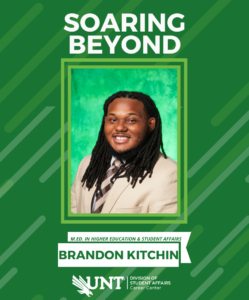Meet Brandon Kitchin (he/him). He graduated with his Master of Education in Higher Education & Student Affairs in May 2021. He currently supports the Emerald Eagle Scholars Program.

Brandon Kitchin (He/Him/His)
We asked Brandon some questions, advice for current students, and how UNT helped them to succeed and SOAR BEYOND!
When you started at UNT, what were your plans after graduation? How have these plans changed? I came to UNT seeking a Master’s in Higher Education and Student Affairs because I fell in love with helping students develop and to see them be successful in their college journeys. I recently graduated at the beginning of May, and I am currently still on the job search, but yes, my vision remains to pursue a career as a Student Affairs professional. I am interested in student leadership, student success initiatives, multicultural services, and DEI work.
What advice do you have for prospective or current students as they decide what they want their next steps to be? Learn how to “be comfortable being uncomfortable” as early as possible; it will bode you well in all your endeavors. It can be easy to feel scared about taking that leap of faith into a new opportunity (perhaps something you never saw coming), but it’s worth it. You may prefer to take the safe route for a project instead of taking that risk but know you’re more than capable of pulling it off. Sometimes the biggest obstacle blocking us from reaching our full potential is ourselves because we psych ourselves out of dreaming big, so that’s why I encourage students as early as possible to set ambitious goals because even if you do fail at achieving them, you’ll learn and grow more in the process than if you decided to do enough to just get by.
How did your program at UNT help you to feel prepared for your role/program/next steps? My program at UNT provided me with all the tools that I need in order to be successful in helping students transition into, though, and out of college. I have learned all about the system and history of higher education and how that affects students’ experiences both positively and negatively. Through my program, I have learned many strategies on how to support students and that starts with being empathetic and being responsible to treat every student in their own unique way. Once I obtain a full-time position, I believe I will be successful in positively impacting students.
How did you find your graduate program? I found out about my graduate program through word of mouth here on campus at UNT while I was participating in a series of job interviews for a job fair. There I met the program coordinator and a student in the program I just completed, and they gave me all the information and I was sold on it from there.
What was the most challenging interview question you have been asked? “How do you personally get behind supporting students representing this racial identity (Black students) within the context of what’s currently going on in our country but also being mindful of your powers and limits as a professional in this position?”
How did the Career Center help you? I have attended several Career Center events and I would say that there have been two that have been extremely helpful. The first was on the topic of your personal brand and brand management. The second was about LinkedIn and how it is extremely useful in terms of networking and finding jobs. I also can say that I received great advice on cover letters and resumes from the Career Center as well.
Share anything else about your story/experience if you would like to that you haven’t already. I am being published on May 19 through TCU (Texas Christian University) Magazine. I had the pleasure of writing the cover story for their Summer 2021 Issue. I wrote about a lynching of a Black man named Fred Rouse which occurred in Downtown Fort Worth in December 1921. This event largely has gone untold for nearly a century, but thanks to a TCU dance professor, this sad but important history is being recognized. I also write about how the racial terror lynching affected the family members – so to add more humanity and realness to make the connection that this event almost a hundred years ago still has consequences today. I also make connections between the act of violence that occurred to Fred Rouse to what occurs today with police brutality, as there were police involved with the killing of Mr. Rouse, though none were convicted. Lastly, it is a fact that the Ku Klux Klan had a heavy presence in Fort Worth during the 1920’s, so I explore how their presence also impacted racial violence, including the lynching that occurred. All that said, the story is still very much in the present and future tense as I write about the work and efforts being done now that will one day help Fort Worth perform restorative social justice.
Want to hear more from Brandon? Check out their testimonial video!
Would you like to be featured in our Soaring Beyond Success Series? Submit your story here and email Jeanette Hickl. We’d love to share your story!



